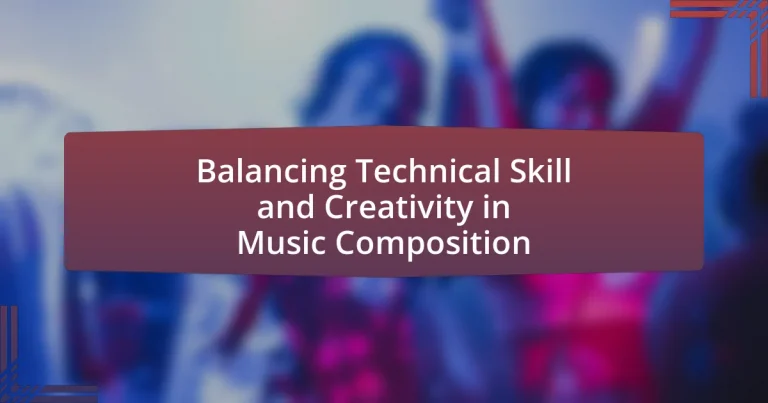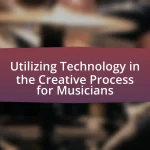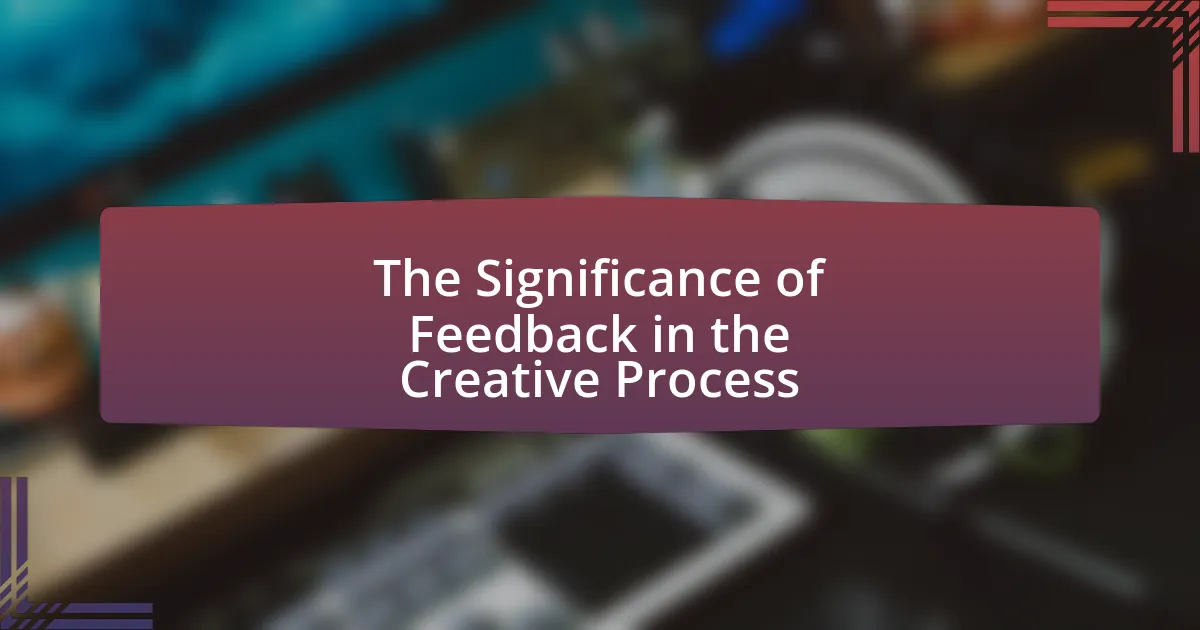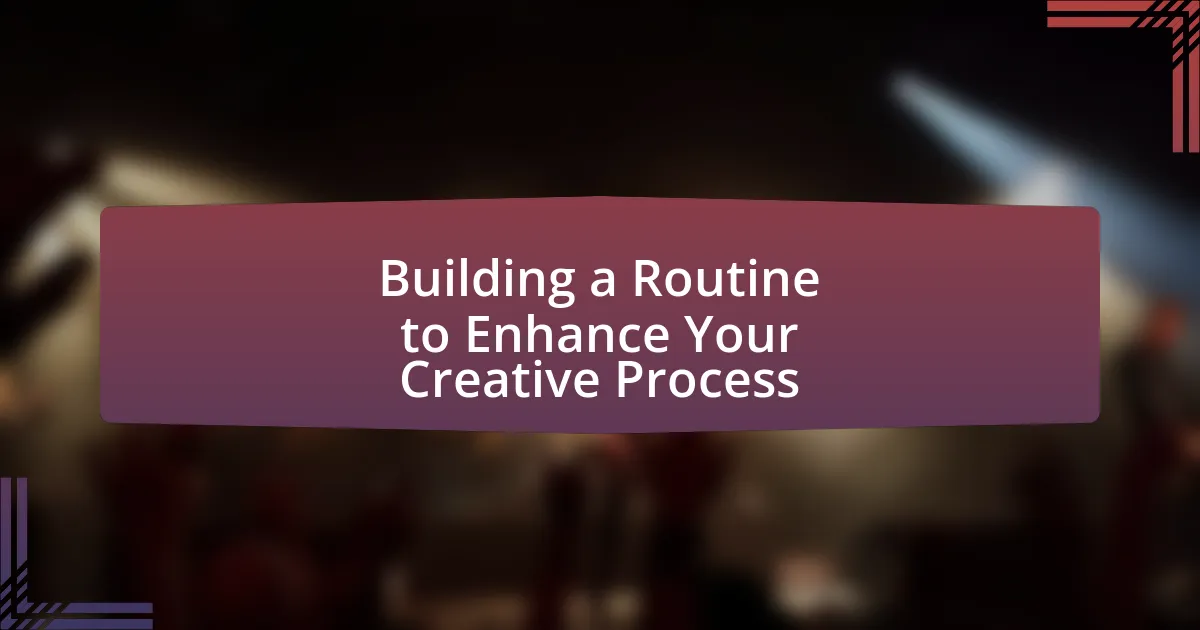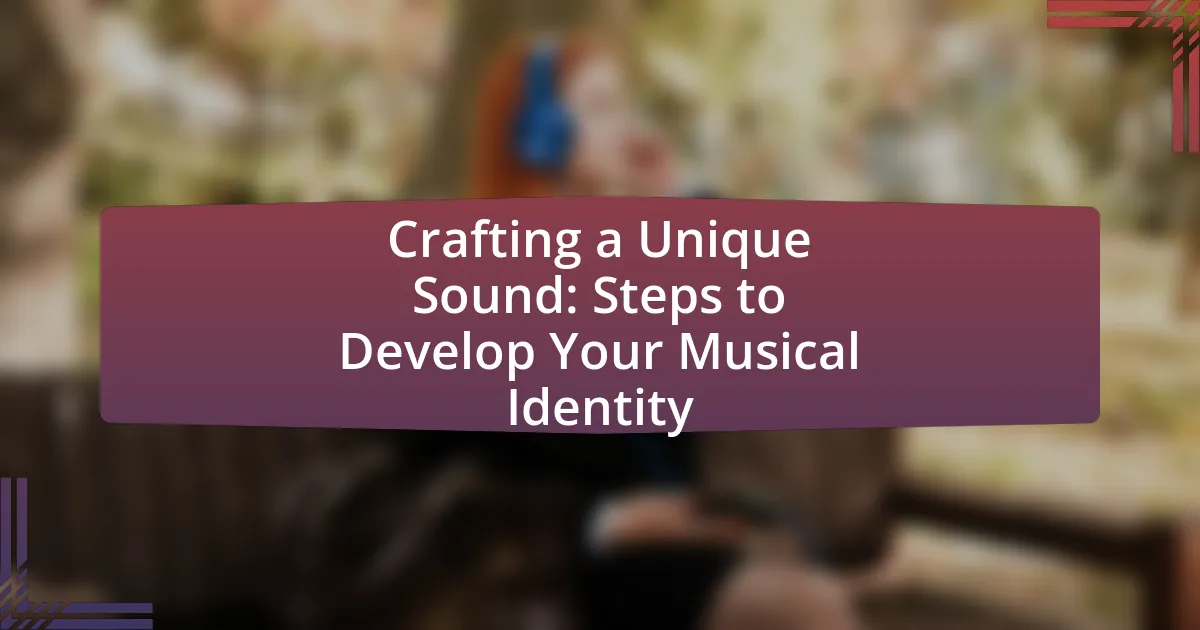The article focuses on the essential balance between technical skill and creativity in music composition. It explores how technical proficiency in music theory, instrumentation, and software enhances the ability to translate creative ideas into structured compositions. The discussion includes the importance of creativity for emotional expression and originality, as well as the challenges composers face when prioritizing one aspect over the other. Additionally, it provides practical strategies for integrating both skills, utilizing technology, and fostering ongoing learning to achieve a harmonious approach to music composition.
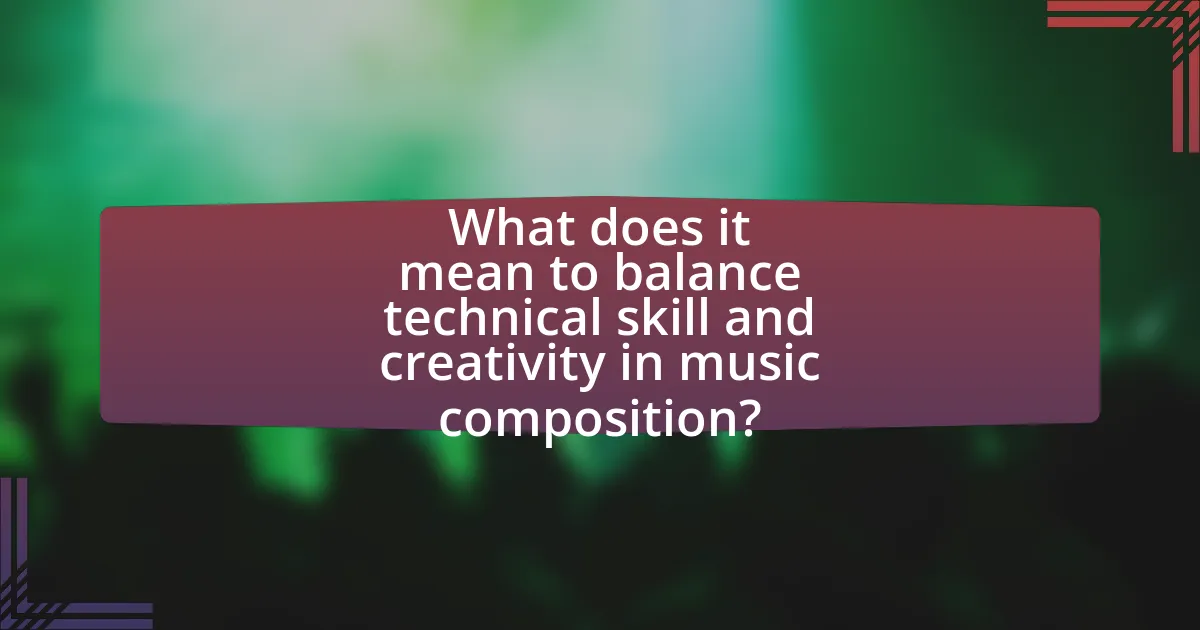
What does it mean to balance technical skill and creativity in music composition?
Balancing technical skill and creativity in music composition means integrating the structured knowledge of music theory and instrumental proficiency with innovative ideas and personal expression. Technical skill provides the foundation for understanding musical elements such as harmony, rhythm, and melody, enabling composers to effectively translate their creative visions into tangible compositions. Creativity, on the other hand, allows for originality and emotional depth, pushing the boundaries of traditional music forms. Research indicates that successful composers often exhibit a blend of both attributes, as seen in the works of composers like Ludwig van Beethoven, who combined rigorous technical mastery with groundbreaking creative ideas, resulting in compositions that are both technically impressive and emotionally resonant.
How do technical skills contribute to music composition?
Technical skills significantly enhance music composition by providing composers with the tools necessary to effectively translate their creative ideas into structured musical forms. These skills, such as proficiency in music theory, instrumentation, and software, enable composers to understand and manipulate musical elements like harmony, melody, and rhythm. For instance, knowledge of music theory allows composers to create complex chord progressions and melodies that resonate emotionally with listeners. Additionally, familiarity with digital audio workstations (DAWs) facilitates the arrangement and production of compositions, making it easier to experiment with sound and texture. This technical foundation not only streamlines the creative process but also expands the possibilities for innovation in music composition.
What specific technical skills are essential for composers?
Essential technical skills for composers include proficiency in music theory, instrumentation, orchestration, and software proficiency in digital audio workstations (DAWs). Music theory knowledge enables composers to understand harmony, melody, and rhythm, which are foundational for creating cohesive compositions. Instrumentation and orchestration skills allow composers to effectively write for various instruments, understanding their ranges and timbres, which enhances the overall sound of the piece. Additionally, familiarity with DAWs, such as Logic Pro or Ableton Live, is crucial for composing, arranging, and producing music in a modern context, as these tools facilitate the manipulation of sound and the integration of various musical elements.
How do these skills enhance the composition process?
Technical skills and creativity enhance the composition process by allowing composers to effectively translate their artistic ideas into structured musical forms. Technical skills provide the necessary knowledge of music theory, instrumentation, and composition techniques, enabling composers to manipulate musical elements such as melody, harmony, and rhythm. Creativity, on the other hand, fosters innovation and personal expression, allowing composers to develop unique musical identities and explore new soundscapes. Together, these skills facilitate a more comprehensive approach to composition, where technical proficiency supports creative exploration, leading to more refined and impactful musical works.
Why is creativity important in music composition?
Creativity is essential in music composition because it allows composers to express unique ideas and emotions, resulting in original works that resonate with listeners. This originality distinguishes music in a saturated market, fostering innovation and artistic growth. Historical examples, such as Beethoven’s innovative use of form and harmony, demonstrate how creativity can redefine musical boundaries and influence future generations. Furthermore, studies show that creative thinking enhances problem-solving skills, which are crucial in overcoming compositional challenges. Thus, creativity not only enriches the artistic process but also contributes to the evolution of music as a whole.
What role does creativity play in the emotional impact of music?
Creativity significantly enhances the emotional impact of music by allowing composers to express unique ideas and feelings. This expression is achieved through innovative melodies, harmonies, and rhythms that resonate with listeners on a personal level. Research indicates that music that incorporates creative elements, such as unexpected chord progressions or novel instrumentation, can evoke stronger emotional responses. For instance, a study published in the journal “Psychology of Music” by Hargreaves and North found that listeners reported heightened emotional experiences when exposed to music that featured creative deviations from traditional structures. Thus, creativity is essential in shaping the emotional landscape of music, making it more relatable and impactful for audiences.
How can creativity influence the originality of a composition?
Creativity significantly influences the originality of a composition by enabling unique expressions and innovative ideas that differentiate a work from existing pieces. When composers apply creative thinking, they can explore unconventional structures, harmonies, and melodies, leading to distinctive musical identities. For instance, the use of unexpected chord progressions or novel instrumentation can result in compositions that stand out in the musical landscape. Historical examples include composers like Igor Stravinsky, whose creative approaches in works like “The Rite of Spring” broke traditional norms and introduced new musical languages, showcasing how creativity directly contributes to originality.
What challenges arise when trying to balance technical skill and creativity?
Balancing technical skill and creativity in music composition presents challenges such as the risk of technical proficiency stifling innovative ideas. Musicians often find that a strong focus on technical execution can lead to formulaic compositions, where adherence to established techniques limits creative expression. Additionally, the pressure to demonstrate technical ability may overshadow the exploration of unique musical concepts, resulting in a lack of originality. Research indicates that musicians who prioritize technical skill may experience a decrease in creative output, as evidenced by studies showing that creativity flourishes in environments that encourage experimentation rather than strict adherence to technical norms.
How can overemphasis on technical skill stifle creativity?
Overemphasis on technical skill can stifle creativity by creating an environment where adherence to established techniques takes precedence over innovative thinking. When musicians focus excessively on mastering technical aspects, they may become constrained by rules and conventions, limiting their ability to explore new ideas or experiment with unconventional approaches. Research indicates that creativity flourishes in environments that encourage risk-taking and exploration, while rigid adherence to technical proficiency can lead to a fear of failure, ultimately suppressing original expression.
What are the risks of prioritizing creativity over technical proficiency?
Prioritizing creativity over technical proficiency in music composition can lead to several risks, including a lack of structural integrity in compositions. When creativity is emphasized without sufficient technical skill, compositions may become disorganized or lack coherence, making it difficult for audiences to engage with the music. Additionally, musicians may struggle to execute their creative ideas effectively, resulting in frustration and diminished artistic expression. Research indicates that technical proficiency is essential for translating creative concepts into polished works, as evidenced by studies showing that skilled musicians are more capable of improvisation and innovation (Hanna-Pladdy & Mackay, 2011, Psychology of Music). Thus, neglecting technical skills can hinder a composer’s ability to fully realize their creative vision.
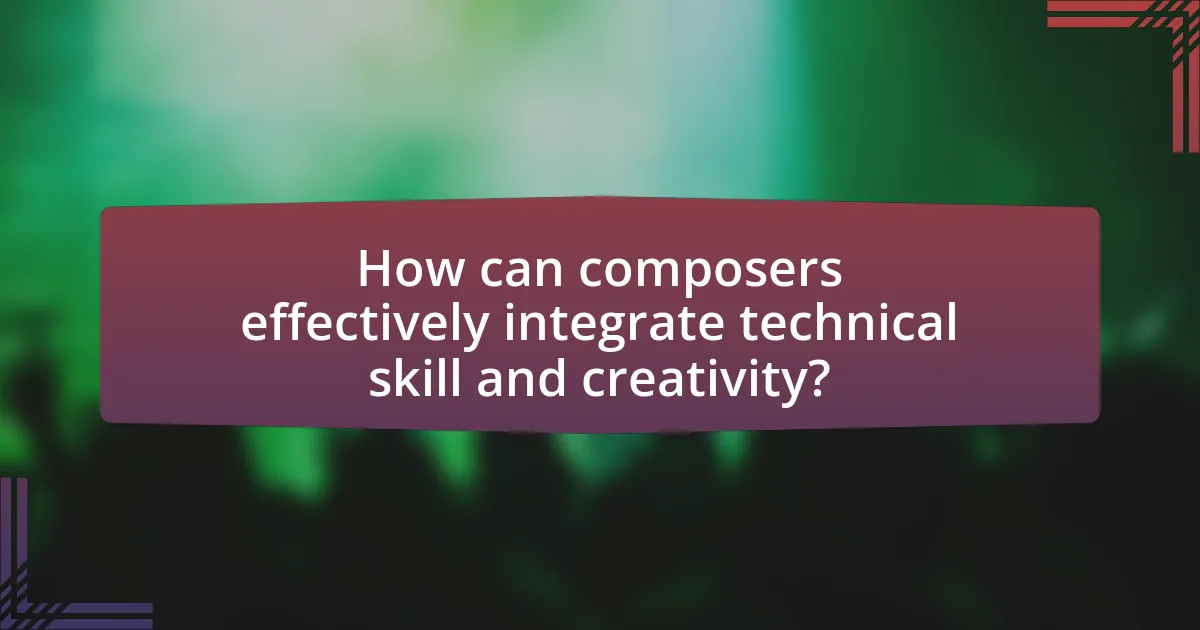
How can composers effectively integrate technical skill and creativity?
Composers can effectively integrate technical skill and creativity by employing structured improvisation techniques that allow for spontaneous expression within a framework of established musical principles. This approach enables composers to utilize their technical knowledge of harmony, rhythm, and form while simultaneously exploring innovative ideas and personal expression. For instance, jazz musicians often practice scales and chord progressions to develop their technical proficiency, which they then apply in improvisational settings, leading to unique and creative musical outcomes. This method demonstrates that a solid foundation in technical skills can enhance creative exploration, resulting in compositions that are both technically sound and artistically original.
What strategies can be employed to foster both skills in composition?
To foster both technical skill and creativity in music composition, one effective strategy is to integrate structured practice with improvisational exercises. Structured practice, such as mastering scales, chord progressions, and music theory, builds the foundational technical skills necessary for composition. Simultaneously, engaging in improvisational exercises encourages creative expression and experimentation, allowing composers to explore new ideas and sounds without the constraints of formal structure. Research indicates that musicians who balance technical proficiency with creative exploration tend to produce more innovative compositions, as seen in studies by Hargreaves and North (1997) which highlight the importance of both skill sets in enhancing overall musical creativity.
How can practice routines be designed to enhance both technical and creative abilities?
Practice routines can be designed to enhance both technical and creative abilities by incorporating structured exercises alongside improvisational activities. Structured exercises, such as scales, arpeggios, and sight-reading, develop technical proficiency, while improvisational activities encourage spontaneous creativity and exploration of musical ideas. Research indicates that combining these approaches leads to a more holistic development of musicianship, as evidenced by a study published in the Journal of Research in Music Education, which found that students who engaged in both technical drills and creative tasks showed greater overall improvement in performance skills and creative expression. This dual approach fosters a balanced skill set, enabling musicians to execute technical tasks with creativity and innovation.
What role does collaboration play in balancing these skills?
Collaboration plays a crucial role in balancing technical skill and creativity in music composition by allowing individuals to leverage diverse strengths and perspectives. When musicians collaborate, they can combine technical expertise with creative ideas, leading to innovative compositions that neither could achieve alone. For instance, a technically skilled musician may provide intricate arrangements, while a creative partner can introduce unique melodies or concepts, resulting in a more well-rounded piece. This synergy enhances the overall quality of the music, as evidenced by numerous successful collaborations in the industry, such as those between producers and artists, which often yield chart-topping hits that showcase both technical proficiency and artistic expression.
How can technology assist in achieving this balance?
Technology can assist in achieving the balance between technical skill and creativity in music composition by providing tools that enhance both aspects simultaneously. Digital audio workstations (DAWs) enable composers to manipulate sound with precision while also offering creative features like virtual instruments and effects that inspire innovative ideas. For instance, software such as Ableton Live and Logic Pro includes built-in tools for music theory, allowing composers to experiment with complex harmonies and rhythms without extensive formal training. Additionally, AI-driven composition tools, like OpenAI’s MuseNet, can generate musical ideas based on user input, fostering creativity while also serving as a learning resource for technical skills. These technologies demonstrate that the integration of technical proficiency and creative exploration can be effectively achieved through modern music composition tools.
What tools and software can help composers develop their technical skills?
Composers can develop their technical skills using tools and software such as digital audio workstations (DAWs), notation software, and music theory apps. DAWs like Ableton Live and Logic Pro X provide a platform for composers to experiment with sound, arrange music, and refine their production techniques. Notation software such as Sibelius and Finale allows composers to write and edit sheet music, enhancing their understanding of musical structure and notation. Additionally, music theory apps like musictheory.net and Tenuto offer interactive lessons and exercises that strengthen theoretical knowledge, which is essential for technical skill development. These tools collectively support composers in honing their craft through practical application and theoretical understanding.
How can technology inspire creativity in music composition?
Technology can inspire creativity in music composition by providing innovative tools and platforms that enhance the creative process. Digital audio workstations (DAWs) allow composers to experiment with sounds, manipulate audio, and layer tracks in ways that were previously difficult or impossible. For instance, software like Ableton Live and Logic Pro X offers a range of virtual instruments and effects that can spark new ideas and facilitate unique soundscapes. Additionally, AI-driven composition tools, such as OpenAI’s MuseNet, can generate musical ideas based on user input, encouraging composers to explore unfamiliar musical territories. This integration of technology not only streamlines the composition process but also opens up avenues for experimentation, leading to more diverse and innovative musical outcomes.
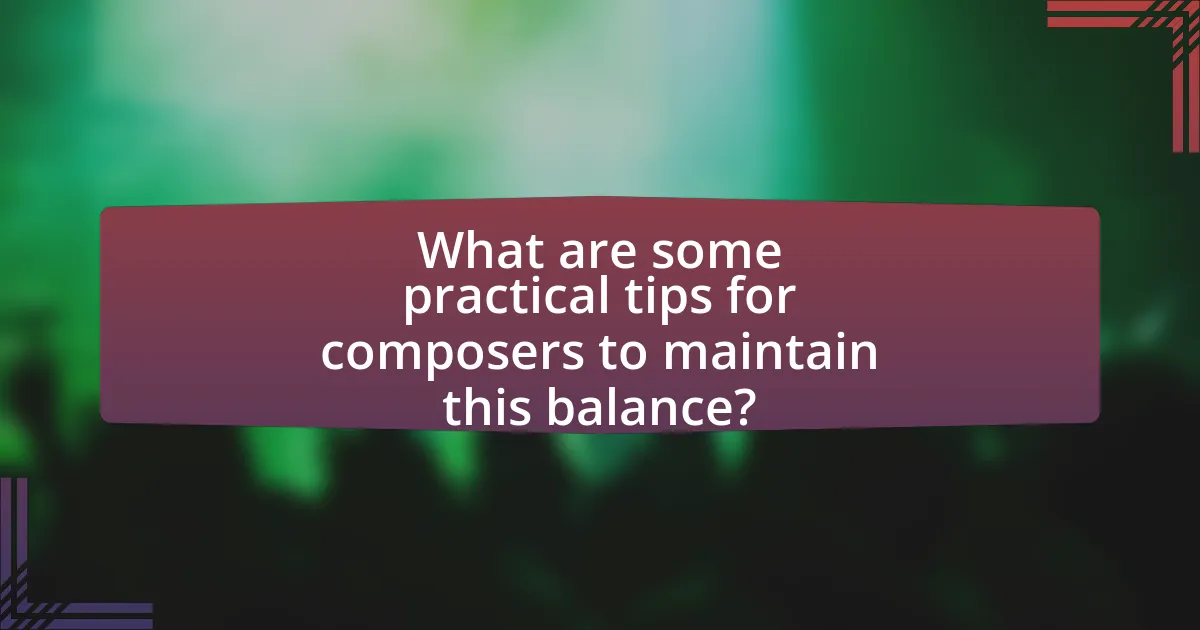
What are some practical tips for composers to maintain this balance?
Composers can maintain a balance between technical skill and creativity by regularly practicing both structured exercises and free improvisation. Structured exercises, such as studying music theory and practicing scales, enhance technical proficiency, while free improvisation encourages creative expression. Research indicates that musicians who engage in both practices develop a more versatile skill set, allowing them to innovate while maintaining technical integrity. Additionally, setting aside dedicated time for both activities ensures that neither aspect is neglected, fostering a holistic approach to music composition.
How can composers set realistic goals for skill development?
Composers can set realistic goals for skill development by assessing their current abilities and identifying specific areas for improvement. This involves conducting a self-evaluation to determine strengths and weaknesses in technical skills, such as harmony, melody, and orchestration. By setting measurable and time-bound objectives, such as completing a specific number of compositions or mastering a particular technique within a defined timeframe, composers can create a structured approach to their development. Research indicates that goal-setting enhances motivation and performance; for instance, a study published in the Journal of Applied Psychology found that individuals who set specific goals performed better than those who did not. Therefore, by utilizing self-assessment and structured goal-setting, composers can effectively balance their technical skill enhancement with their creative pursuits.
What methods can be used to track progress in both areas?
To track progress in both technical skill and creativity in music composition, musicians can utilize a combination of self-assessment, peer feedback, and performance analysis. Self-assessment involves regularly evaluating one’s own compositions and technical exercises, allowing musicians to identify areas of improvement and set specific goals. Peer feedback provides external perspectives, enabling musicians to gain insights into their creative processes and technical execution from fellow composers or instructors. Performance analysis, which includes recording and reviewing performances, helps musicians assess their technical proficiency and creative expression in real-time. These methods collectively foster a balanced development of both technical skills and creative abilities in music composition.
What common pitfalls should composers avoid in their journey?
Composers should avoid the pitfall of neglecting their unique voice in favor of conforming to trends. This can lead to a loss of authenticity and originality, which are crucial for standing out in a competitive field. Additionally, overemphasis on technical skill at the expense of emotional expression can result in music that feels mechanical rather than engaging. Research indicates that successful compositions often blend technical proficiency with personal expression, highlighting the importance of maintaining a balance between these elements. Composers should also be wary of isolation; collaboration and feedback from peers can enhance creativity and provide valuable perspectives.
How can composers recognize when they are leaning too heavily in one direction?
Composers can recognize when they are leaning too heavily in one direction by actively seeking feedback from peers and audiences, as well as self-assessing their work against established compositional principles. Regularly soliciting critiques allows composers to identify patterns in their music that may favor either technical skill or creativity excessively. For instance, if a composer consistently receives comments about their work being overly complex or lacking emotional depth, it indicates a potential imbalance. Additionally, comparing their compositions to a diverse range of styles can highlight areas where they may be overly reliant on specific techniques or ideas, thus reinforcing the need for a more balanced approach.
What resources are available for ongoing learning and improvement?
Resources available for ongoing learning and improvement in music composition include online courses, workshops, and instructional books. Platforms like Coursera and Udemy offer courses specifically focused on music theory, composition techniques, and creativity, allowing learners to enhance their technical skills and artistic expression. Additionally, attending workshops led by experienced composers provides hands-on experience and personalized feedback, which is crucial for growth. Instructional books, such as “The Complete Idiot’s Guide to Music Composition” by Michael Miller, offer structured guidance and exercises that reinforce learning. These resources collectively support continuous development in both technical skills and creative processes in music composition.
Which books, courses, or workshops are recommended for composers?
Recommended books for composers include “The Complete Idiot’s Guide to Music Composition” by Michael Miller, which provides foundational knowledge and practical exercises. “Composing Music: A New Approach” by William Russo and Jeffrey Ainis offers a structured method for developing compositional skills. Online courses such as Berklee College of Music’s “Music Composition” and Coursera’s “Songwriting for Beginners” are also beneficial, providing structured learning and feedback. Workshops like the “Composers Workshop” at the Aspen Music Festival allow for hands-on experience and mentorship from established composers. These resources collectively enhance both technical skills and creative expression in music composition.
